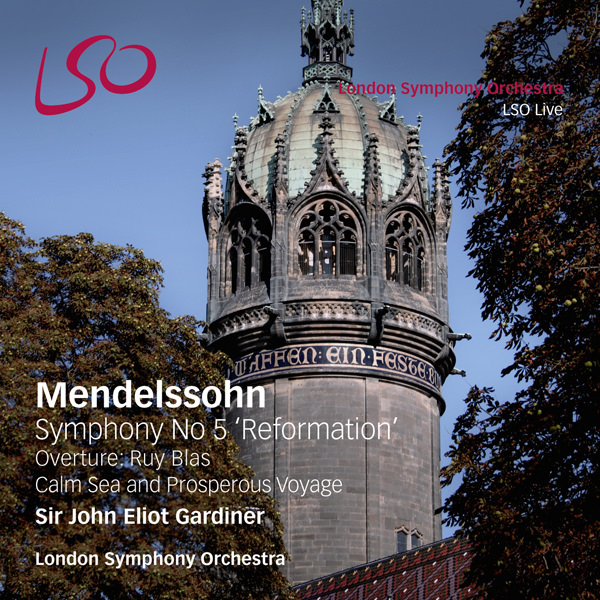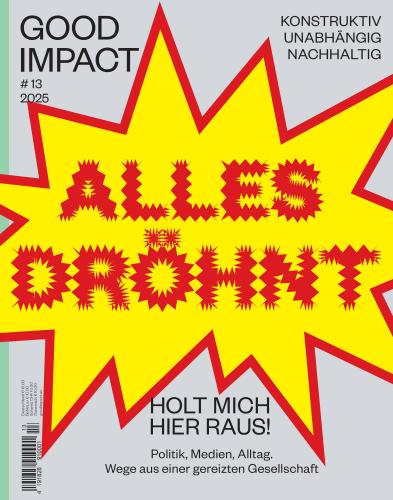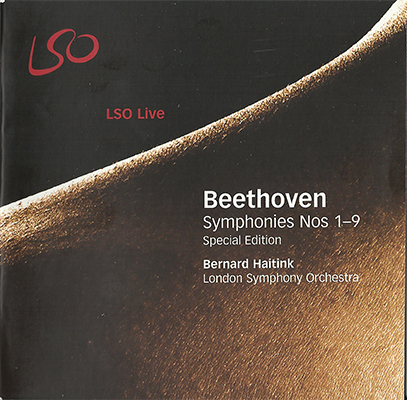
Felix Mendelssohn – Symphony No. 5 ‘Reformation’ – London Symphony Orchestra, Sir John Eliot Gardiner (2015)
FLAC (tracks) 24-bit/96 kHz | Time – 47:09 minutes | 840 MB | Genre: Classical
Studio Master, Official Digital Download – Source: Qobuz | Booklet, Front Cover | © LSO Live
Recorded live in DSD, 23 March 2014 and 2 October 2014 at the Barbican, London
Sir John Eliot Gardiner and the London Symphony Orchestra join forces once again in the latest instalment of their exploration of Mendelssohn’s symphonies.
Mendelssohn’s Symphony No 5, commonly known as the ‘Reformation’ Symphony, was written in 1830 to commemorate the 300th anniversary of the Augsberg confession – a seminal event in the Protestant Reformation. Allusions to the symphony’s title and inspiration can be heard throughout the music itself; the Dresden Amen is cited by the strings in the first movement whilst the finale is based on Martin Luther’s well-known chorale Ein feste Burg ist unser Gott (‘A Mighty Fortress is Our God’).
Coupled with this are two of Mendelssohn’s overtures, Calm Sea and Prosperous Voyage and Ruy Blas, both of which were inspired by literary works. Calm Sea and Prosperous Voyage, based on two short poems by Goethe, depicts the journey of sailors at sea with a still adagio opening ultimately giving way to a triumphant homecoming. Completing the album, the overture Ruy Blas was commissioned by the Leipzig Theatre as an overture to Victor Hugo’s tragic drama of the same name.
This is the second instalment in John Eliot Gardiner’s projected complete Mendelssohn symphony cycle with the LSO. Whereas the earlier release in the series featured his only recording of the Scottish Symphony, Gardiner has already given us a fine version of the Reformation with the Vienna Philharmonic for DG. Like the present release, the 1998 Vienna performance was recorded live, and thus offers fascinating comparison.
Gardiner’s interpretation has not changed drastically over the years: his adopted tempo for individual movements and inner details of phrasing and articulation seem relatively consistent between the two versions. The greatest difference lies in the respective orchestras’ sound. Whereas in Vienna Gardiner indulged in the strings’ richer tone quality most obviously in the expressive account of the Andante, he extracts a leaner but no less atmospheric sound from his London forces, the violins performing here standing up as they apparently did for Mendelssohn in Leipzig. The Barbican’s drier acoustic allows the wind and brass to pierce through the texture with more thrilling impact particularly in the finale where the chorale ‘Ein feste Burg’ resounds with triumphant affirmation, driving the music towards a powerful and exciting conclusion. Earlier, Gardiner secures some wonderfully light articulation in the scherzo. The middle section of this movement is particularly delightful, its irresistible charm pointing forward to Dvořák.
It’s a pity that the disc as a whole offers rather short measure and that room wasn’t found for another of the composer’s concert overtures. Nonetheless, there’s much to savour in Gardiner’s urgently driven account. -Erik Levi, BBC Music Magazine
Tracklist:
Felix Mendelssohn (1809-1847)
1 Overture ‘Ruy Blas’ Op 95[7’17]
2 Overture ‘Calm Sea and Prosperous Voyage’ Op 27[11’48]
Symphony No 5 ‘Reformation’ Op 107
3 Andante – Allegro con fuoco[11’00]
4 Allegro vivace[4’46]
5 Adagio[3’36]
6 Choral ‘Ein’ feste Burg ist unser Gott’: Andante con moto – Allegro maestoso[8’42]
Personnel:
London Symphony Orchestra
Sir John Eliot Gardiner, conductor
Download:
mqs.link_MendelsshnSymphnyN.5LSSirJhnElitGardiner2015Qbuz2496.rar




















![Carl Nielsen - Symphonies Nos. 1-6 - London Symphony Orchestra, Sir Colin Davis (2015) [Blu-Ray Pure Audio Disc + DSF Stereo DSD64/2.82MHz] Carl Nielsen - Symphonies Nos. 1-6 - London Symphony Orchestra, Sir Colin Davis (2015) [Blu-Ray Pure Audio Disc + DSF Stereo DSD64/2.82MHz]](https://getimg.link/images/imgimgimg/uploads/2015/09/Wnf48VE.jpg)
![Sir Simon Rattle, Berliner Philharmoniker - Jean Sibelius - Symphonies Nos. 1-7 (2015) [Blu-ray Disc + Pure Audio Blu-ray Disc + FLAC 5.1 24bit/192kHz] Sir Simon Rattle, Berliner Philharmoniker - Jean Sibelius - Symphonies Nos. 1-7 (2015) [Blu-ray Disc + Pure Audio Blu-ray Disc + FLAC 5.1 24bit/192kHz]](https://getimg.link/images/imgimgimg/uploads/2016/02/htbd2jO.jpg)

![London Symphony Orchestra, John Eliot Gardiner - Mendelssohn: Symphonies Nos 1-5, Overtures, A Midsummer Night’s Dream (2018) [FLAC 24bit/96kHz] London Symphony Orchestra, John Eliot Gardiner - Mendelssohn: Symphonies Nos 1-5, Overtures, A Midsummer Night’s Dream (2018) [FLAC 24bit/96kHz]](https://getimg.link/images/imgimgimg/uploads/2019/01/qZzAoIN.jpg)
![London Symphony Orchestra, Sir John Eliot Gardiner - Stravinsky: Oedipus Rex, Apollon musagete (2014) [FLAC 24bit/96kHz] London Symphony Orchestra, Sir John Eliot Gardiner - Stravinsky: Oedipus Rex, Apollon musagete (2014) [FLAC 24bit/96kHz]](https://getimg.link/images/imgimgimg/uploads/2019/07/ka2l4Ox.jpg)
![London Symphony Orchestra, Sir John Eliot Gardiner - Mendelssohn: Symphonies Nos 1 & 4 ‘Italian’ (2016) [Qobuz FLAC 24bit/192kHz] London Symphony Orchestra, Sir John Eliot Gardiner - Mendelssohn: Symphonies Nos 1 & 4 ‘Italian’ (2016) [Qobuz FLAC 24bit/192kHz]](https://getimg.link/images/imgimgimg/uploads/2018/03/7S8DnXm.jpg)
![London Symphony Orchestra, Sir John Eliot Gardiner - Mendelssohn: Symphonies Nos 1 & 4 ‘Italian’ (2016) [Qobuz FLAC 24bit/192kHz] London Symphony Orchestra, Sir John Eliot Gardiner - Mendelssohn: Symphonies Nos 1 & 4 ‘Italian’ (2016) [Qobuz FLAC 24bit/192kHz]](https://getimg.link/images/imgimgimg/uploads/2018/11/7S8DnXm.jpg)
![Sir Colin Davis, London Symphony Orchestra - Haydn: Symphonies Nos. 92 & 93, 97-99 (2014) [Qobuz FLAC 24bit/96kHz] Sir Colin Davis, London Symphony Orchestra - Haydn: Symphonies Nos. 92 & 93, 97-99 (2014) [Qobuz FLAC 24bit/96kHz]](https://getimg.link/images/imgimgimg/uploads/2017/08/O1wILBY.jpg)
![Maria Callas - Remastered The Complete Studio Recordings 1949-1969 (2014) [Qobuz FLAC 24bit/96kHz] Maria Callas - Remastered The Complete Studio Recordings 1949-1969 (2014) [Qobuz FLAC 24bit/96kHz]](https://getimg.link/images/imgimgimg/uploads/2018/12/Vw7IHlv-1.jpg)
![John Eliot Gardiner - J.S. Bach: St. Matthew Passion, BWV 244 (2017) [Qobuz FLAC 24bit/96kHz] John Eliot Gardiner - J.S. Bach: St. Matthew Passion, BWV 244 (2017) [Qobuz FLAC 24bit/96kHz]](https://getimg.link/images/imgimgimg/uploads/2018/08/3isp9C9.jpg)
![Monteverdi Choir, English Baroque Soloists, Sir John Eliot Gardiner - Bach: Motets (2012) [Qobuz FLAC 24bit/48kHz] Monteverdi Choir, English Baroque Soloists, Sir John Eliot Gardiner - Bach: Motets (2012) [Qobuz FLAC 24bit/48kHz]](https://getimg.link/images/imgimgimg/uploads/2018/01/5PSNANM.jpg)
![Monteverdi Choir, London Symphony Orchestra & Sir John Eliot Gardiner - Mendelssohn: A Midsummer Night’s Dream (2017) [FLAC 24bit/96kHz] Monteverdi Choir, London Symphony Orchestra & Sir John Eliot Gardiner - Mendelssohn: A Midsummer Night’s Dream (2017) [FLAC 24bit/96kHz]](https://getimg.link/images/imgimgimg/uploads/2017/12/fpunfe5.jpg)
![Steve Reich - Sextet, Music for Pieces of Wood, Clapping Music - LSO Percussion Ensemble (2016) [B&W FLAC 24bit/96kHz] Steve Reich - Sextet, Music for Pieces of Wood, Clapping Music - LSO Percussion Ensemble (2016) [B&W FLAC 24bit/96kHz]](https://getimg.link/images/imgimgimg/uploads/2017/04/32X8kN6.jpg)
![Roman Simovic, LSO String Ensemble - Vaughan Williams: Fantasia on a Theme by Thomas Tallis (2016) [Qobuz FLAC 24bit/96kHz] Roman Simovic, LSO String Ensemble - Vaughan Williams: Fantasia on a Theme by Thomas Tallis (2016) [Qobuz FLAC 24bit/96kHz]](https://getimg.link/images/imgimgimg/uploads/2019/01/ZMC6s0a.jpg)
![London Symphony Orchestra & Sir John Eliot Gardiner - Schumann: Symphonies Nos. 1 & 3 (2020) [FLAC 24bit/96kHz] London Symphony Orchestra & Sir John Eliot Gardiner - Schumann: Symphonies Nos. 1 & 3 (2020) [FLAC 24bit/96kHz]](https://getimg.link/images/imgimgimg/uploads/2020/08/C2JOAi2.jpg)